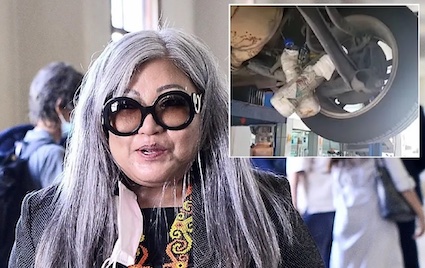Domestic terrorism comes to Malaysia

Attempted assassination of lawyer/activist Siti Kassim crosses red line
Murray Hunter
On June 21, the activist lawyer Siti Kassim took her car to an automobile center in the Bangsar district of Kuala Lumpur to service it before she drove across the peninsula to Kelantan to handle a case for the indigenous community known as the Orang Asli, or first people.
When the car was raised on the hydraulic hoist, the serviceman found a bomb rigged to the underside. The bomb squad, which took an hour and a half to arrive, cordoned off the area. The device was taken off the car, photographed, and then destroyed by a controlled explosion, destroying much of the evidence.
The crude IED, consisting of two bottles and wires, was found behind the rear tire of the car. It was most probably attached to Siti’s car in the early hours of the morning in her apartment building carpark and was set to explode as heat built up while driving. Fortunately, her drive to the automobile service center was a very short one. The bomb was said by police to be powerful enough to have almost certainly killed her, had she been in the car when it exploded.
Attempted assassination met with silence
Siti Kassim is an activist lawyer who takes up legal cases no one else wants to take, on behalf of the marginalized and discriminated against. Most of her work is done pro-bono and she has specialized in the plight of the Orang Asli over the years. She is a member of the Malaysian Bar’s human rights committee and the deputy co-chair of the Committee on Orang Asli Rights and has defended indigenous communities against human rights violations by logging and mining interests on their lands. She is also a prominent advocate for the LGBTI community. She has often offended some ulamas, or Islamic councils, and conservative Muslim groups. She has been critical of governments over the years, and often received the wrath of politicians.
What is surprising is the silence of politicians over the attempted bombing. Prime Minister Anwar Ibrahim, the communications and multimedia minister Fahmi Fadzil, the minister for law reform Azalina Othman Said, and home minister Saifuddin Nasution Ismail have all been silent, as well as all of the rest of the cabinet and all opposition members.
In addition, most NGOs and liberal Malay groups have also remained quiet. There has even been condemnation of Siti on social media for her liberal views, which are despised by more conservative Muslims. Some of the more extreme have gone as far as saying, padan muka dia, or she deserves it.
With the state elections in Kelantan, Terengganu, Kedah, Penang, Selangor, and Negeri Sembilan coming up on August 12, no politician is brave enough to take a stand on the issue out of fear that some in the Malay community will see them as sympathetic with Siti’s liberal views, costing them potential electoral support in conservative states.

